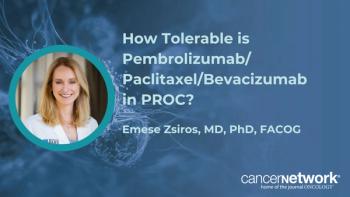
Oncology NEWS International
- Oncology NEWS International Vol 6 No 7
- Volume 6
- Issue 7
Dr. Baltimore Says It's Time to Revive AIDS Vaccine Ideas
BETHESDA, Md--It's time to recycle some old ideas in AIDS vaccines, Nobel laureate David Baltimore, PhD, told the Advisory Committee to the Director of the National Institutes of Health.
BETHESDA, Md--It's time to recycle some old ideas in AIDS vaccines,Nobel laureate David Baltimore, PhD, told the Advisory Committee to theDirector of the National Institutes of Health.
Dr. Baltimore, currently at the Massachusetts Institute of Technologyand president-elect of the California Institute of Technology, chairs anadvisory committee named by NIH director Harold Varmus, MD, to devise acomprehensive national research program to develop an effective AIDS vaccine.Looking at the candidate AIDS vaccines tested so far, Dr. Baltimore expressedhis concern that none of them may be able to effectively prevent the disease.
The growing understanding of how the human immunodeficiency virus changesand functions has led him to conclude that scientists need to reconsidera variety of vaccine approaches discarded earlier, he said. These includekilled viruses, virus-like particles, protein-based vaccines, naked DNA,and live, attenuated vaccines.
Because a live vaccine would involve actually infecting people, albeitwith a crippled virus, "that concept is appropriately worrisome,"Dr. Baltimore acknowledged. Nonetheless, that approach could be the mosteffective.
"What the committee is doing is trying to suggest new scientificinitiatives," he said. "What we'd most like to do is get newvaccine concepts under testing." However, he emphasized that an AIDSvaccine will take years to perfect: "It is intrinsic to the developmentthat it takes a long time."
Dr. Baltimore said the AIDS vaccine committee has held a series of regionalworkshops intended to generate new ideas and bring new minds into the effort."We would like to encourage people who have not worked on HIV to comeinto the field," he said.
Articles in this issue
over 28 years ago
Researchers Report Conflicting Data on Cervical Cancer in AIDSover 28 years ago
CIN Website Now Offers Daily Online Cancer Newspaperover 28 years ago
Members Sought for Director's Consumer Liaison Group: NCIover 28 years ago
Trial Attempts to Reverse Taxol Resistance in Ovarian Cancerover 28 years ago
Taxotere Bests Adriamycin in Metastatic Breast Cancerover 28 years ago
Antiemetic Tablets Prove Equal in Efficacy to IV Drug Regimenover 28 years ago
Preop Chemotherapy May Have Advantages in Primary Breast Cancerover 28 years ago
Doxorubicin Benefits Older Breast Cancer PatientsNewsletter
Stay up to date on recent advances in the multidisciplinary approach to cancer.










































